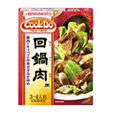Ajinomoto
Ajinomoto
Ajinomoto
Ajinomoto
Ajinomoto
Ajinomoto
Ajinomoto
Ajinomoto
Ajinomoto
Ajinomoto[edit | edit source]
Ajinomoto is a Japanese food and biotechnology corporation that produces seasonings, cooking oils, frozen foods, beverages, sweeteners, amino acids, and pharmaceuticals. The company is best known for its production of monosodium glutamate (MSG), a flavor enhancer that is widely used in cooking.
History[edit | edit source]
Ajinomoto was founded in 1909 by Kikunae Ikeda, a Japanese chemist who discovered the umami taste, which is one of the five basic tastes alongside sweet, sour, bitter, and salty. Ikeda isolated glutamic acid as the source of umami and developed a method to produce MSG from wheat. The company was established to commercialize this discovery, and it quickly became a major player in the food industry.
Products[edit | edit source]
Ajinomoto's product line includes a variety of food products and ingredients:
- Seasonings: Ajinomoto produces a range of seasonings, including MSG, which is marketed under the brand name "Ajinomoto". Other seasonings include dashi, soy sauce, and various spice blends.
- Cooking Oils: The company offers a selection of cooking oils, including vegetable oils and specialty oils for different culinary applications.
- Frozen Foods: Ajinomoto manufactures a wide array of frozen foods, such as gyoza, ramen, and other ready-to-eat meals.
- Beverages: The company produces various beverages, including coffee and tea products.
- Sweeteners: Ajinomoto is involved in the production of sweeteners, including aspartame, which is used in many low-calorie and sugar-free products.
- Amino Acids: The company is a leading producer of amino acids, which are used in food, pharmaceuticals, and animal nutrition.
Biotechnology and Pharmaceuticals[edit | edit source]
Ajinomoto has expanded its operations into the biotechnology and pharmaceutical sectors. The company develops and manufactures amino acids and other compounds for use in pharmaceuticals, nutraceuticals, and cosmetics. Ajinomoto's biotechnology division focuses on the development of fermentation technologies and the production of bio-based chemicals.
Global Presence[edit | edit source]
Ajinomoto operates in over 30 countries and regions worldwide, with a strong presence in Asia, North America, and Europe. The company has numerous production facilities and research centers dedicated to developing new products and improving existing ones.
Environmental and Social Responsibility[edit | edit source]
Ajinomoto is committed to sustainability and social responsibility. The company has implemented various initiatives to reduce its environmental impact, such as improving energy efficiency, reducing waste, and promoting sustainable sourcing of raw materials. Ajinomoto also engages in community development projects and supports educational programs.
Related Pages[edit | edit source]
Search WikiMD
Ad.Tired of being Overweight? Try W8MD's physician weight loss program.
Semaglutide (Ozempic / Wegovy and Tirzepatide (Mounjaro / Zepbound) available.
Advertise on WikiMD
|
WikiMD's Wellness Encyclopedia |
| Let Food Be Thy Medicine Medicine Thy Food - Hippocrates |
Translate this page: - East Asian
中文,
日本,
한국어,
South Asian
हिन्दी,
தமிழ்,
తెలుగు,
Urdu,
ಕನ್ನಡ,
Southeast Asian
Indonesian,
Vietnamese,
Thai,
မြန်မာဘာသာ,
বাংলা
European
español,
Deutsch,
français,
Greek,
português do Brasil,
polski,
română,
русский,
Nederlands,
norsk,
svenska,
suomi,
Italian
Middle Eastern & African
عربى,
Turkish,
Persian,
Hebrew,
Afrikaans,
isiZulu,
Kiswahili,
Other
Bulgarian,
Hungarian,
Czech,
Swedish,
മലയാളം,
मराठी,
ਪੰਜਾਬੀ,
ગુજરાતી,
Portuguese,
Ukrainian
Medical Disclaimer: WikiMD is not a substitute for professional medical advice. The information on WikiMD is provided as an information resource only, may be incorrect, outdated or misleading, and is not to be used or relied on for any diagnostic or treatment purposes. Please consult your health care provider before making any healthcare decisions or for guidance about a specific medical condition. WikiMD expressly disclaims responsibility, and shall have no liability, for any damages, loss, injury, or liability whatsoever suffered as a result of your reliance on the information contained in this site. By visiting this site you agree to the foregoing terms and conditions, which may from time to time be changed or supplemented by WikiMD. If you do not agree to the foregoing terms and conditions, you should not enter or use this site. See full disclaimer.
Credits:Most images are courtesy of Wikimedia commons, and templates, categories Wikipedia, licensed under CC BY SA or similar.
Contributors: Prab R. Tumpati, MD




